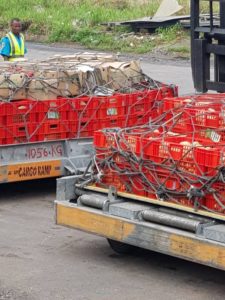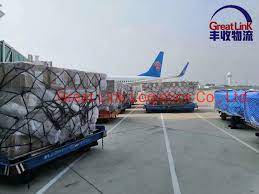
According to the Central Bank of Nigeria (CBN), Nigeria earned N4. 13 trillion from oil and gas exports in 2021, but experts who are versed in export of perishable farm produce believe Nigeria can earn double of this amount from just export of agricultural goods alone.
Currently Nigeria is an import dependent country, where cargo planes come to drop goods and go to Kenya, Ghana or other African countries to carry farm produce to Europe, Americas, Australia, Asia and others.
Confirmed export and import figures from cargo freighting from international airports in Nigeria in 2021 and part of 2022, indicated that in 2021 Nigeria imported 77, 819, 036 tonnes of cargo and in the same period exported 14, 190, 465 tonnes of cargo.
In the first six months of 2022, Nigeria imported 25,868, 554. 64 tonnes of cargo and exported 7, 974, 225 tonnes of cargo. So in 2021, Nigerian imports were 81.8 per cent higher than exports by air and in the first six months of 2022, it was 68.8 per cent.
Experts told THISDAY that Nigeria can contribute significantly in feeding the world, if the Nigerian government prioritises exports by abiding by international standards that farm produce are subjected to.
This, he said, would make the produce accepted in international markets, just as many African countries have done.
Speaking, Director, Operations at Cargolux Airlines, a freighter company and also the President of Association of Foreign Airlines Representatives in Nigeria (AFARN), Kingsley Nwokoma, said, “We potentially have so much to export, but currently we are not exporting much. We export very few farm produce, perishables, but not like Nairobi (Kenya), which exports flowers all year round to Europe and Americas. They also export potatoes to Asia, America and Europe.
“When the freighters come to Lagos, they drop their cargo and go to Kenya and pick up flowers to Europe,” he said.
Reports indicate that Kenya earned the some of $983 million (108.9 billion Kenya shillings) from flower exports alone in 2020.
Reuters also reported that Kenya’s earnings from exports of cut flowers, fruits and vegetables rose 5 per cent in 2021 from the previous year.
Recently, the Kenyan National Bureau of Statistics was quoted as saying that in its latest economic indicators released February 22, 2022, horticulture earnings rose to 158.1 billion Kenyan shillings ($1.39 billion) in 2021 from 150.2 billion shillings a year earlier.
Nwokoma told THISDAY that Ghana is doing much better than Nigeria in the export of farm produce.
Ghana, he added, exports mangoes, oranges and yam to different countries of the world, noting that the major set back for Nigeria is processing and procedures.
“There is international standard, which you must meet so that your produce will be accepted by international chain stores all over the world. The problem with us is that we are not process driven. Before you start any major export, you have to invite them to your farm or make them see how you produce your crops. They would want to make sure you are following the globally accepted processes. Nigeria has the best yams, tomatoes, mangoes, even the most temperate climate to plant crops and have the best species of flowers but we lack the processes, which are key to meeting world standards,” he said.
Also, CABI, a scientific international organisation that supports agricultural development in the world, especially in the East and West Africa, reported that Ghana recorded vegetable exports to Europe of chilli peppers, eggplants and gourds, worth $15 million a year. This was after it resumed such exports following the lifting of a ban imposed by the EU in 2015 because of concerns about the management of quarantine pests.
Nwokoma said big retailers like Walmart, Tesco, Sainsbury and others must know the provenance of the agricultural crops they sell because they are held responsible if they sell the wrong ones to their customers.
“So the big challenge confronting Nigeria is standards, which Nwokoma said could be overcome if the government shows commitment to export of farm produce from Nigeria.
“To begin to solve this problem, government must meet with the stakeholders in the industry. In other countries, governments pay serious attention to such businesses and encourage people to export and earn forex. Government also has a duty to engage the end users so that they will develop interest in Nigerian exports,” he said.
Nwokoma regretted that Nigeria’s attention has been paid to oil for too long and said very soon oil won’t be a major forex earner for Nigeria, as the world is beginning to shun hydrocarbon.
“Nigeria is the best producer of mangoes. We have all kinds of variety and the proper climate to grow them. We are the highest producer of cassava and yam in the world. We are not maximisng the opportunities that we have. Some countries, like the United Arab Emirates (UAE) import everything they eat,” he said.
The President of AFARN said that for Nigeria to improve its exports, it must improve packaging and processing of its goods, noting that Ghana brings many of the perishable goods like yam from Nigeria and packages them well and sell them as Ghanaian yam, called puna, in Europe.

“I was in Accra, Ghana recently and I went to a company that exports agricultural produce like banana and mango and I saw how they cut them, clean them and package them. You will be so impressed. Unlike in the past, most parts of the world eat yam now. They eat yam in New Zealand, Australia and Nigerians in Europe and everywhere expect to eat yam wherever they are in the world so it is in huge demand,” he said.






